|
|
|
Sort Order |
|
|
|
Items / Page
|
|
|
|
|
|
|
| Srl | Item |
| 1 |
ID:
173129
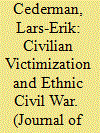

|
|
|
|
|
| Summary/Abstract |
While many studies provide insights into the causes of wartime civilian victimization, we know little about how the targeting of particular segments of the civilian population affects the onset and escalation of armed conflict. Previous research on conflict onset has been largely limited to structural variables, both theoretically and empirically. Moving beyond these static approaches, this article assesses how the state-led targeting of specific ethnic groups affects the likelihood of ethnic conflict onset and the evolution of conflicts once they break out. Relying on a new data set with global coverage that captures the ethnic identity of civilian victims of targeted violence, we find evidence that the state-led civilian victimization of particular ethnic groups increases the likelihood that the latter become involved in ethnic civil war. We also find tentative, yet more nuanced, evidence that ethnic targeting by state forces affects the escalation of ongoing conflicts.
|
|
|
|
|
|
|
|
|
|
|
|
|
|
|
|
| 2 |
ID:
173133
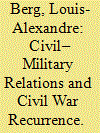

|
|
|
|
|
| Summary/Abstract |
Does restructuring security forces reduce the risk of civil war recurrence? Prior research has examined effects of military integration in alleviating commitment problems, but the evidence has been inconclusive. Other aspects of civil–military relations have received less attention. This article examines the effects of civil–military relations in the context of postwar struggles to consolidate authority. It outlines three pathways through which security forces contribute to renewed civil war: by excluding rival factions and facilitating insurgent mobilization, by exploiting control over resources to challenge the regime, or by escalating incipient insurgency through repression. Analysis of original, cross-national data on postwar civil–military relations shows that reducing the potential for exclusion and exploitation through diverse officer appointments and robust civilian oversight lowers the risk of civil war. These findings emphasize the distributive effects of restructuring security forces and highlight the value of examining political contests around state institutions to understand why civil wars restart.
|
|
|
|
|
|
|
|
|
|
|
|
|
|
|
|
| 3 |
ID:
173130


|
|
|
|
|
| Summary/Abstract |
To what extent does sexual violence influence rebel group fragmentation? A substantial body of research explores wartime rape as a cohesion-building mechanism following forced recruitment. However, the relationship between sexual violence and broader organizational structural integrity has not been systematically tested. Our study on the effects of sexual violence on rebel group fragmentation provides this test. We argue that sexual violence increases cohesion at the battalion level but increases the risk of fragmentation of the broader organization because lieutenants are more likely to split from organizations if they are confident that their subordinate battalions are cohesive and will follow them. We test this argument on a global sample of 105 rebel organizations active between 1989 and 2014. The results provide robust support for the argument showing sexual violence increases the probability of fragmentation by a factor of six. This presents a crucial contribution to our understanding of sexual violence and rebel group fragmentation.
|
|
|
|
|
|
|
|
|
|
|
|
|
|
|
|
| 4 |
ID:
173135


|
|
|
|
|
| Summary/Abstract |
How do countries settle disputes in the shadow of the law? Even in the presence of legalized dispute settlement, countries still rely on diplomatic channels to resolve conflicts. But it can be difficult to assess diplomacy’s impact on dispute resolution because those channels tend to be opaque. We present both an original theory of the impact of diplomacy on dispute resolution and a novel measure of diplomacy. If countries with close or, conversely, distant relationships use legal channels for dispute resolution, diplomacy will have little impact on dispute settlement; resorting to legal recourse among friends or adversaries likely means that the dispute is intractable. However, diplomacy can increase the chances of settlement between countries with moderate levels of affinity. We test this argument using a protocol-based proxy for diplomatic interactions—gifts given at the occasion of meetings between diplomatic counterparts—that would otherwise be difficult to observe. Using the case of the United States and its disputes in the World Trade Organization, we find support for our argument. This suggests that even when countries resort to legalized methods of dispute settlement, bilateral dealmaking still plays an important role.
|
|
|
|
|
|
|
|
|
|
|
|
|
|
|
|
| 5 |
ID:
173137
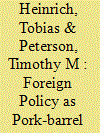

|
|
|
|
|
| Summary/Abstract |
Foreign policy often creates geographically concentrated domestic benefits. A prominent example is the tying of development aid to purchases from the donor country. This feature of aid highlights the utility in examining foreign policy as an instance of pork-barrel politics. Considering tied aid in terms of legislators’ incentives to provide constituent benefits, we argue that people will support an increase in foreign aid spending more when it would promote local economic activity, while opposing aid cuts more when reduced local economic output would result. Crucially, we also expect that people will support their state’s US senator more when informed that the senator attempted to secure (or retain) locally beneficial funds. We find support for our expectations in a novel survey experiment of US citizens. Our results suggest that legislators’ electoral incentives, and consequential local spending, can help explain the adoption of foreign policies despite national-level public disapproval.
|
|
|
|
|
|
|
|
|
|
|
|
|
|
|
|
| 6 |
ID:
173136
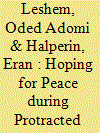

|
|
|
|
|
| Summary/Abstract |
Hope is an essential component in the pursuit of political change. In order to hope, citizens need to wish for the change and have some expectations that it could materialize. This article explores how the two components of hope (i.e., wishes and expectations) are constructed in the seemingly hopeless case of a protracted and violent conflict. Utilizing a large-scale survey administered in Israel, the West Bank, and the Gaza Strip, we show that citizens’ appraisals of their adversary’s wishes and expectations for peace affect their own wishes and expectations, which, in turn, influences their willingness to support peacebuilding efforts. Regrettably, citizens’ tendency to underestimate their rival’s wish for peace lessens their own hopes, which further abates the support for peacebuilding. The study is the first to illustrate a mechanism by which hope for peace is constructed and the pathways by which hope facilitates resolution. Theoretical and applied implications are discussed.
|
|
|
|
|
|
|
|
|
|
|
|
|
|
|
|
| 7 |
ID:
173141
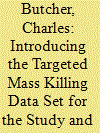

|
|
|
|
|
| Summary/Abstract |
This article describes a new data set for the study of genocide, politicide, and similar atrocities. Existing data sets have facilitated advances in understanding and policy-relevant applications such as forecasting but have been criticized for insufficient transparency, replicability, and for omitting failed or prevented attempts at genocide/politicide. More general data sets of mass civilian killing do not typically enable users to isolate situations in which specific groups are deliberately targeted. The Targeted Mass Killing (TMK) data set identifies 201 TMK episodes, 1946 to 2017, with annualized information on perpetrator intent, severity, targeted groups, and new ordinal and binary indicators of genocide/politicide that can serve as alternatives to existing measures. Users are also able to construct their own indicators based on their research questions or preferred definitions. The article discusses the concept and operationalization of TMK, provides comparisons with other data sets, and highlights some of the strengths and new capabilities of the TMK data.
|
|
|
|
|
|
|
|
|
|
|
|
|
|
|
|
| 8 |
ID:
173134
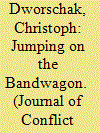

|
|
|
|
|
| Summary/Abstract |
When confronted with mass uprisings, governments deploy their security forces for crowd control or repression. However, sometimes security agencies choose to side with the opposition movement. Recent work shows that “fragmentation” contributes to defection: fragmenting the security forces into parallel units leads to oversight problems and grievances among soldiers, which raises the risk of members of the security forces defecting to the opposition movement. However, I argue that the effect on defection is strongly moderated by the circumstances under which states choose to fragment their military: fragmentation for the purpose of security specialization, called “differentiation,” even decreases its risk. Employing Bayesian multilevel modeling, the findings corroborate this distinction. The study contributes to the fundamental discussion on civil–military relations, shedding light on why some conflict situations see security defections while others do not. Understanding this phenomenon is a pivotal element to explaining how conflicts develop, escalate, and end.
|
|
|
|
|
|
|
|
|
|
|
|
|
|
|
|
| 9 |
ID:
173140


|
|
|
|
|
| Summary/Abstract |
Some theories predict that profits facilitate peace in illegal markets, while others predict that profits fuel violence. I provide empirical evidence from drug trafficking in Venezuela. Using original data, I compare lethal violence trends in municipalities near a major trafficking route to trends elsewhere, both before and after counternarcotics policy in neighboring Colombia increased the use of Venezuelan transport routes. For thirty years prior to this policy change, lethal violence trends were similar; afterward, outcomes diverged: violence increased more along the trafficking route than elsewhere. Together with qualitative accounts, these findings illuminate the conditions under which profits fuel violence in illegal markets.
|
|
|
|
|
|
|
|
|
|
|
|
|
|
|
|
| 10 |
ID:
173139
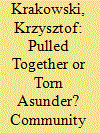

|
|
|
|
|
| Summary/Abstract |
Evidence on the consequences of war for community cohesion is mixed, pointing to both positive and negative effects of conflict. This study examines symmetry of force between warring actors as an explanation of heterogeneous conflict effects. Using survey data from 224 Colombian villages, I compare cohesion in communities exposed to asymmetric and symmetric conflicts, a guerrilla war between rebels and the state and a more conventional war between rebels and paramilitary groups, respectively. I find that symmetric war increases participation in community organizations, while asymmetric war decreases trust. Evidence suggests three mechanisms that explain these findings. Symmetric war increases cohesion (i) by spurring individuals to band together to cope with significant disruption of services and (ii) by strengthening group identities that map onto fairly clear wartime cleavages. Asymmetric war reduces cohesion (iii) by instilling fear and suspicion linked to wartime experiences of civilian collaboration and denunciations.
|
|
|
|
|
|
|
|
|
|
|
|
|
|
|
|
| 11 |
ID:
173131
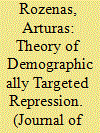

|
|
|
|
|
| Summary/Abstract |
People from specific ethnic, religious, or other externally identifiable groups are often subjected to harsher repression than others. This phenomenon of demographically targeted repression is often viewed as a result of xenophobia. I provide a rationalist explanation of demographic targeting to understand why this form of repression is employed even without xenophobic motives. Building on the empirical literature, I model an environment where a threat of repression may motivate people to oppose the regime defensively. I show that, in such conditions, the regime may use demographic targeting to undermine cross-group collective action. The model explains when demographic targeting is used and how it shapes the behavior and identity of citizens. I use the model to make sense of certain aspects of repression policy in China
|
|
|
|
|
|
|
|
|
|
|
|
|
|
|
|
| 12 |
ID:
173132


|
|
|
|
|
| Summary/Abstract |
In this article, we investigate the relationship between elections and coup attempts. We argue that elections have opposing effects on the risk of coup attempts, depending on the state of the economy in which they are held. Elections occurring in conditions of economic crisis spur anti-government mobilization and high levels of state repression. This increases the subsequent risk of coup attempts. Conversely, elections held during economic expansion induce pro-government mobilization and waning repression, which reduces the subsequent risk of coups. We find strong support for these propositions in a statistical analysis of 130 countries that conducted contested elections in the period 1952 to 2013. The results are robust to an array of model specifications, including when we account for election outcome, postelection economic performance, and the possibility that both elections and economic performance are endogenous to coup attempts.
|
|
|
|
|
|
|
|
|
|
|
|
|
|
|
|
| 13 |
ID:
173138
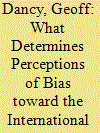

|
|
|
|
|
| Summary/Abstract |
The International Criminal Court (ICC) has struggled with the perception that it is biased against Africans, especially in relation to its investigation in Kenya. But which Kenyans are most likely to believe the ICC is biased? Building on pluralistic models of public opinion and psychological studies, we aim to contribute to emerging research on attitudes toward international courts. We expect that group attachments will drive attitudes toward international institutions. Yet, we also theorize that exposure to violence makes individuals more likely to support international justice and reject narratives that would have the effect of insulating those who have committed crimes from being held accountable. Using new survey data from 507 Kenyans in the fall of 2015, we find support for our hypotheses.
|
|
|
|
|
|
|
|
|
|
|
|
|
|
|
|
|
|
|
|
|